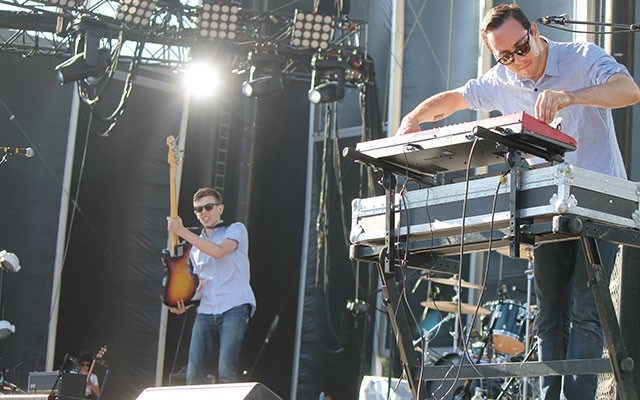Graham Wright is at home in Ontario.
"If you can believe it, for once! For the next day. I'm in the midst of packing up all my shit and then going on tour," says Wright, keyboardist with Tokyo Police Club.
The U.S. side of the band's current tour starts in Buffalo in a few days and is being seen, in that sensible Canadian way, as an opportunity to take advantage of superior American freeways.
"It's quick. It's a way to get across the country because there are these vast spaces (in Canada)," Wright says.
Ask him how big the tour is and you can almost hear his eyes getting wider over the phone.
"It's big! I didn't realize it, but it's definitely the longest tour we've done in a while. Seven weeks, I think," he says.
Tokyo Police Club has already been to the region in recent months, having performed at the Squamish Valley Music Festival in August.
They return for a headlining night in Whistler, on Wednesday, Nov. 12, at Millennium Place. Performing with them are Vancouver's garage rock duo The Pack A.D. and indie rockers Said the Whale.
Wright says bands have to clock in and get the work done and that means plenty of days on the road.
"That's kind of what you have to do these days. You've got to work and go out and do your job," he says.
This professionalism was embraced by the band's four members — along with Wright there is David Monks, Josh Hook and Greg Alsop — from the time they launched themselves in 2005. Their EP Lesson in Crime came out in 2006. Smith came out in 2007.
Within two years, Tokyo Police Club had performed at Coachella, Glastonbury and Lollapalooza — and appeared on David Letterman.
They were all around the age of 20.
"I'm not sure it was a professional approach from day one, but it was certainly intended to be," Wright says. "I don't know how to account for that. We just went for it in a way that seemed steady. When you're 19, you've got to do what feels right. And fortunately, what seemed right to us put us on a path that worked.
"Very quickly we got these opportunities, but we realized that they were just opportunities. They're not anything else. We decided that if we wanted to transform these opportunities into success, something tangible, we had to bust our asses until that happened."
He added that meeting their manager, Rich Cohen, early on helped them navigate the scary waters of early success.
"If we hadn't met him, I don't think I'd be talking to you today," Wright says. "We weren't wise beyond our years. Realistically, someone saved us and sometimes we saved ourselves from disaster at the last minute."
Having had a longstanding tie with CBC Radio 3 in Toronto on air and producing, Wright has taken most of 2014 off to concentrate on the band.
"It didn't excite me enough to talk about music because I live it all the time. It's interesting in its way... but I don't think bands are interesting enough to sustain as conversation that there is about bands. People like the music and because they like the music, they want to learn more and they're drawn to it," Wright says.
"But the end of the day, every band's story is the same with a few outliers. They're just trying to do good stuff; they drive around in a van and do it. And that's fine. The music should speak for itself but it's not the world we live in.
"In the end, I hated it. I felt my enthusiasm wasn't honest and anytime I feel that way I think it's time for a break because no one wins if you feel that way. You're doing everyone a disservice... I'd like to do more broadcast stuff but it has to make sense with what I'm about."
Tokyo Police Club's latest album, Forcefield, came out earlier this year — their first album in four years.
Asked if it's doing well, Wright says he can't tell.
"I can't tell anymore. I did all of the traditional, for me, metrics. Album sales, how is it selling? I get told not to worry about that because no one buys albums anymore. Don't look at the numbers because you're going to think they're bad but the shows are going good. People seem to know the words to the songs," he says.
"The main thing is that we're still able to work and as long as that is the case, then something is going OK."
The length of time between Forcefield and their previous effort, Ten Songs, Ten Years, Ten Days, "didn't feel that long" to Wright. They were writing and performing the whole time.
"We were doing stuff the whole time and working really hard. We thought we spent the amount of time we needed to make the product we needed to make. I stand by that in terms of the quality of the record but I'm not entirely certain it was a smart career move," he laughs.
"And the more you spend on something, the greater the opportunity for life to get in the way."
Tickets are $29 for the general public and $27 for Whistler Arts Council members and can be purchased at Millennium Place or at whistlerartscouncil.com. Please note this is a 19+ event.




